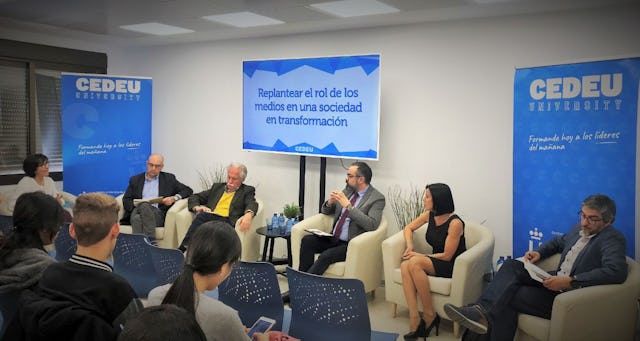A frank look at the news and its social impact
MADRID — A group of prominent Spanish journalists met recently to grapple with the news media’s impact on social cohesion and the rise of radicalization. The setting was a roundtable discussion on 15 March, organized by Spain’s Baha’i Office of Public Affairs at the King Juan Carlos University Center for University Studies.
“The function of journalism is to make objective information known to the public for the common good,” argued Rafael Fraguas, co-founder of the major daily newspaper El Pais. “Today information is conflated with opinion. The compromising of objectivity—the highest form of honesty—in the news media is leading to ignorance, and it is clear today where ignorance is taking society.”
The event involved a roundtable discussion among five individuals who work with some of Spain’s major media organizations: Mr. Fraguas; Jesús Bastante, the editor in chief of the online publication Religión Digital; Beatriz de Vincete de Castro, a lawyer and media personality; Francisco Castañón, director of the online magazine Entreletras; and Juana Pérez, an editor with the international news agency Pressenza. The discussion took place before an audience of some forty students and faculty.
Participants explored the conflicting forces that are shaping news coverage today. Immediacy and cutbacks in funding have restrained the ability of journalists to pursue in-depth analyses. These same forces incentivize sensationalized and superficial stories that often seek to appeal to emotions of anger and mistrust. Yet, many journalists are deeply aware of these trends and want to pursue more profound stories that explore the complexities of a situation affecting society and to help build understanding.
“In society, there are processes of disintegration and hopelessness that attract large audiences and processes of integration that instill hope but are not always covered. Therefore, journalists have to choose between putting on a show and making judgements, and informing in a trustworthy manner that fosters hope,” Ms. Pérez explained in the discussion.
Layla Sant from the Baha’i Office of Public Affairs explained the aims of the event. “Media has an impact on how society sees and perceives reality,” she said. “This dialogue is an early and necessary step in building conversation in our society about the values and framework that can enable the media to fulfill its role and responsibility for the betterment of society.”
The roundtable emerged from a seminar co-organized by the Baha'i community in October on the prevention of violent radicalization. “We found an important theme to explore further is the place of the news media in the positive and negative forces playing out in society today,” said Dunia Donaires, also of the Office of Public Affairs. “So we decided to organize a series of discussions for journalists to analyze elements that initiate radicalization, such as polarizing and conflictual coverage, and explore how the media might counter these.”
The Office of Public Affairs is planning future roundtables. It aspires to give momentum to a growing conversation in the country about the values and responsibilities of the media and ultimately to lead to further actions that can foster social harmony. The Office is also working with the Autonomous University of Madrid to teach a three-day summer school course about the prevention of violent radicalization.
